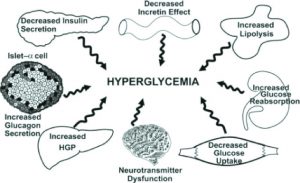By Axel Martinez, MD, Family Practice
 I wish you a Happy Diabetes Awareness Month. Yet, it is not something that anyone is happy about. Diabetes is a scary word, especially if one is the recipient of the diagnosis. It’s usually a forever deal and it takes a long time to learn to cope with it, treat it and have it under control.
I wish you a Happy Diabetes Awareness Month. Yet, it is not something that anyone is happy about. Diabetes is a scary word, especially if one is the recipient of the diagnosis. It’s usually a forever deal and it takes a long time to learn to cope with it, treat it and have it under control.
You can google diabetes and get a ton of information. It can even lead to more confusion about what it is, what it does, and how to take care of it. You can ask most people and they will tell you it’s a disease of the pancreas where your body can’t process sugar well. It’s actually a lot more complicated than that. The following picture is the current model that doctors have right now that cause diabetes, they call it the ominous octet.
It’s different organs having different problems and these are called the Ominous Octet. This means eight different problems happening in the body at the same time, that cause what we know as diabetes. In the current research they have come up with 14 different things. That study will likely be coming out soon. My point is 8-14 different things going on at the same time in the body is complicated. It’s complex for a doctor and it’s complicated for a patient.
Why do I care? Besides being a doctor, I still care about what happens in diabetes because my family has had it on all sides. I was worried for a long time it was trying to catch me. It was inevitable, it’s in my genes, and I can’t outrun it. You see, being overweight, obese and having sedentary lifestyles are linked to it. My point is many people are at risk, including myself. Many people are in the early stages and haven’t been diagnosed. Most of us don’t know how or what to do with this very common chronic illness.
Well, what do you do? You go find a doctor that can help you. Most of the time it will be your PCP, or primary care provider. A doctor knows the usual tests to order and some new tests can help diagnose earlier diabetes and pre-diabetes, these included a urinalysis, a hemoglobin glycosylated A1C, and sometimes even a fasting insulin depending on the doctor. You might not be aware that by time someone is usually diagnosed with diabetes, only 20% of the cells in your pancreas responsible for making insulin are working. So physicians and patients have to be more aggressive with diagnosing diabetes and pre-diabetes.
What do I do if I have diabetes? Well that is also a complicated answer. You should definitely see your doctor about it. If you don’t have a doctor, you need one. Let me explain. Diabetes is hard to treat, but it’s treatable. Back in the days there was insulin, then they added oral medications, such as metformin, which were the only solutions we had available. Later came the medications that could cause our blood sugar to go lower, and worked similar to insulin. But recently in the past couple of years, there have been new medications that help doctors with the treatment of diabetes much better than about 10 years ago. We have different families of medications at our disposal that can help with diabetes and could even help with weight loss in diabetics that are overweight. These medications range from medications that help you void excess Your doctor should be aware and ready to confront the challenges of Diabetes with you. This is a challenge that you confront together. It requires a physician, diabetes educator, dietitian, eye doctor and the patient to work together to overcome the hurdles associated with this challenging disease. I hope this article gives you a better insight and the hope that Diabetes is treatable, and you can get better and live healthily through Diabetes with help.
MRMC
Munroe Regional Medical Center
9401 SW Highway 200
Bldg 6000, Suite 6001, Ocala, FL
352-291-1300
Check Also
Revolutionizing Neuropathy Treatment: The Summus Laser Approach at LaserLab
Neuropathy, a condition affecting an estimated 42.5 million Americans, can significantly impact one’s quality of …
 Central Florida Health and Wellness Magazine Health and Wellness Articles of the Villages
Central Florida Health and Wellness Magazine Health and Wellness Articles of the Villages



